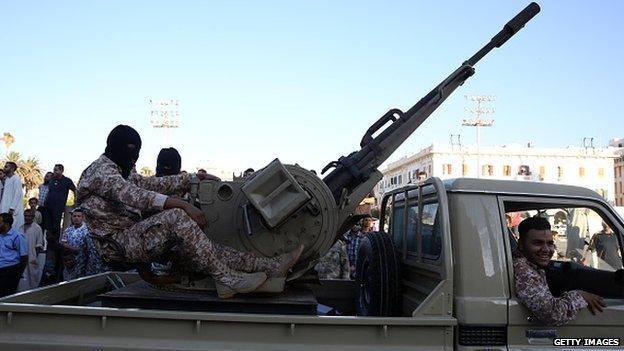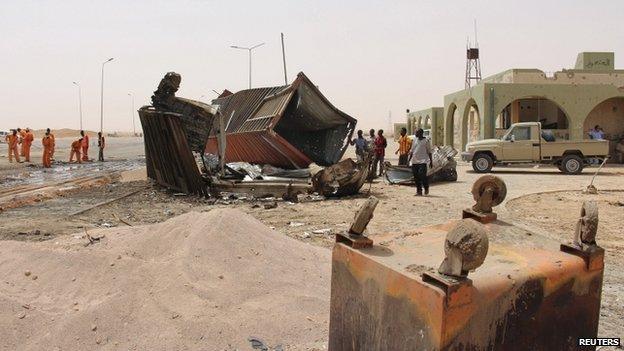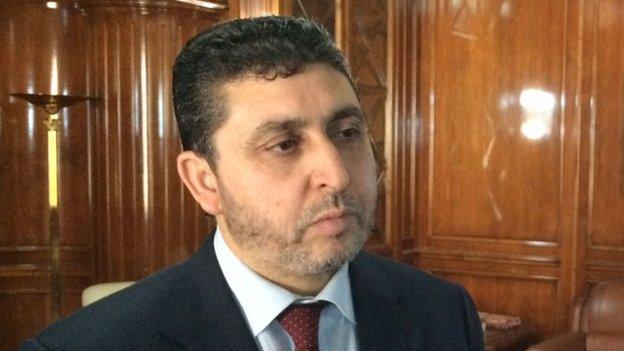Uneasy calm hides turbulence in Tripoli
- Published

The atmosphere in Tripoli remains tense
The main airport has been destroyed, all the main embassies have been closed down, the big international hotels all stand empty. There are long and frequent power cuts.
And yet Tripoli appears entirely calm.
Cars choke the streets as they always have, the cafes are mostly full, the shop windows still have expensive goods in them.
There are no longer any roadblocks, and armed men don't swagger around the streets. I haven't heard the sound of gunfire once.
Yet none of this means that peace has descended on Tripoli.
It is quiet because the city has been carved up by two rival warlords, and their forces are so finely balanced that it is not in the interests of either of them to attack the other.
And directly you look below the surface, you start to find the problems that afflict people here.
Hospital shortages
When I went to the main hospital, the Tripoli Medical Centre, the first thing I saw was an old man being wheeled out on a gurney and put into an ambulance.
He had a serious heart condition. The hospital couldn't treat him, so he was being sent to Tunisia for medical help.
The road trip, which is dangerous because of the gangs and militias which operate along various parts of it, cost him or his family $1,500 (£960); his treatment in a Tunisian hospital will cost far more.
The Tripoli Medical Centre, like all hospitals in this country, is crippled by a shortage of medicines, a lack of equipment, and the flight of almost all foreign nurses.

Islamic State have attacked forces loyal to the self-declared government in Tripoli
In 2012, there were around 1,500 nurses at the Centre.
Most of the countries they tend to come from - the Philippines and Ukraine in particular - have advised their citizens to leave.
Now there are only around 250 nurses left, almost none of them specialists in helping with operations or with the more complicated forms of care.
In the children's cancer ward I watched as a father leaned lovingly over his baby son, his eyes red with tears. The boy urgently needs a bone-marrow transplant. His mother is ready to be a donor.
Nowadays, though, the hospital doesn't have the equipment, the drugs or the nursing staff to carry out the operation.
It could be done at a hospital in Turkey, but the cost would be $150,000 - far beyond the parents' ability to pay.
The doctor was close to tears himself. It was, he believed, all the fault of the politicians.
"This is a rich country," he said, "but they can't agree on who should run it."
Two governments
Libya has no single, united government: it has two, one in Tobruk and one here in Tripoli, each claiming the right to run the country.
In June 2014, the Muslim Brotherhood lost the national election and refused to accept the new House of Representatives (HoR) which had been elected.
In the violence which followed, the HoR fled eastwards.

Khalifa al-Ghawi is battling against Islamic State
There is some talk of forming a government of national unity, but the divisions seem very wide at present.
In the meantime, little gets done.
It is impossible to create an atmosphere of security, so foreigners stay away - whether they are entrepreneurs, hospital engineers or nurses.
The so-called Islamic State (IS) maintains its foothold in Libya because the Tripoli government can't summon up the military strength to destroy it.
The current prime minister in the Tripoli government, Khalifa al-Ghawi, is strongly opposed to IS, and welcomed suggestions that Britain might join the fight in Libya.
"We fight terrorists and criminals and extremists," he told me.
"We don't reject any offers of help to kill this disease, because it will infect the entire international community."
For most of the people I've spoken to here, though, the best way the Tripoli government can help to put the country back on its feet would be to forget its political differences with the politicians in Tobruk.

Tripoli government:
Khalifa al-Ghawi is acting prime minister of the new General National Congress (GNC), a group claiming to be the legitimate continuation of the former Libyan parliament in Tripoli.
The new GNC was formed by politicians from the blocs that lost the June 2014 elections in Libya.
It claims to be a legitimate continuation of the General National Congress elected in 2012, but does not represent a majority of the membership of that congress.
The new GNC is dominated by the Muslim Brotherhood's Libyan party, the Justice and Construction Party, and other smaller groups allied to the Muslim Brotherhood.

It's all a very long way from the joy that greeted the downfall of Colonel Gaddafi in 2011.
I put it to Khalifa al-Ghawi that people were saying now that they wished Gaddafi was still in power. He shrugged.
"It's a free country," he said.